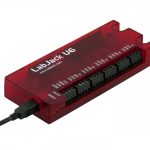U6 – Multifunction DAQ with USB

-
- 14 Analog Inputs (16-18+ Bits Depending on Speed)
-
- U6-Pro Adds 24-bit Low-Speed ADC for 22-Bit Effective Resolution
-
- Single-Ended Inputs (14) or Differential Inputs (7)
-
- Instrumentation Amplifier Inputs
-
- Software Programmable Gains of x1, x10, and x100
-
- Analog Input Ranges of ±10, ±1, and ±0.1 Volts
-
- Built-In CJC Temperature Sensor
-
- 2 Fixed Current Outputs (200/10 μA)
-
- 2 Analog Outputs (12-Bit, ~0-5 Volts)
-
- 20 Digital I/O
-
- Up to 2 Counters (32 Bits Each)
-
- Up to 4 Timers (Pulse Timing, PWM Output, Quadrature Input, …)
-
- Supports SPI, I2C, and Asynchronous Serial Protocols (Master Only)
-
- Supports Software or Hardware Timed Acquisition (Hi-Speed Converter Only)
-
- Maximum Input Stream Rate of 50 kHz (Depending on Resolution)
-
- Capable of Command/Response Times Less Than 1 Millisecond
-
- Built-In Screw Terminals for Some Signals
-
- USB 2.0/1.1 Full Speed Interface
-
- Powered by USB Cable
-
- Drivers Available for Windows, Linux and Mac.
-
- Examples Available for C/C++, VB, LabVIEW, Python, and More
-
- Includes USB Cable and Screwdriver
-
- Free Firmware Upgrades
-
- Money Back Guarantee
-
- Enclosure Size Approximately 3″ x 7″ x 1″ (75mm x 185mm x 30mm)
-
- Rated for Industrial Temperature Range (-40 to +85 Degrees C)
Analog Inputs:
The LabJack U6 has 14 external analog inputs (AIN0-AIN13). AIN0-AIN3 are available on screw terminals and also on the DB37 connector. All 14 analog inputs are available on the DB37 connector.
The maximum input range is ±10 volts, with software selectable gains of x1, x10, and x100. Each analog input can be measured single-ended, or differentially in even/odd pairs. Analog input resolution is 16 bits at max speed (~20 μs conversion time), increasing to 18+ bits at slower speeds (see Sections 3.1 and 3.2 of the User’s Guide). Input impedance is at least 1 GΩ, with typical input bias currents of only 20 nA.
Command/response (software timed) analog input reads typically take 1-4 ms depending on number of channels and communication configuration. Hardware timed input streaming (supported with hi-speed converter only) has a maximum rate that varies with resolution from 4 ksamples/s at 18 bits to 50 ksamples/s at 16 bits.
The U6-Pro has all the features of the normal U6 with the addition of an auxiliary low-speed high-resolution (24-bit) sigma-delta ADC. Analog input resolution varies from 19.5 bits (RMS or Effective) at max speed (4 ms conversion time), to 22 bits at slower speeds (160 ms conversion time).
For more information about the analog inputs see Section 2.7 and Appendix A of the User’s Guide. For data rate information see Sections 3.1 and Sections 3.2. The User’s Guide can be found on theU6 Support page.
Temperature Sensor:
The LabJack U6 has a temperature sensor located very close to the AIN0-AIN3 screw-terminals. Accuracy is ±2 degrees C (max). This sensor is particularly useful for thermocouple cold junction compensation (CJC).
Fixed Current Outputs:
The LabJack U6 has 2 fixed current outputs of 10 μA and 200 μA. These are useful for measuring resistance (resistors, thermistors, RTDs).
Analog Outputs:
The LabJack U6 has 2 analog outputs (DAC0 and DAC1) that are available both on screw terminals and the DB37 connector. Each analog output can be set to a voltage between about 0 and 5 volts with 12-bits of resolution. The analog outputs are based on a true voltage reference.
The analog outputs are updated in command/response mode, with a typical update time of 1-4 ms depending on communication configuration.
For more information about the analog outputs see Section 2.8 and Appendix A of the User’s Guide. For data rate information see Section 3.1. The User’s Guide can be found on the U6 Support page.
Digital I/O:
The LabJack U6 has 20 digital I/O channels which can be individually configured as input, output-high, or output-low.
The first 4 FIO are available on screw terminals and the DB37 connector. All 8 FIO and 3 MIO are available on the DB37 connector, and 8 EIO and 4 CIO are available on the DB15 connector. Note that on the U6, CIO0-CIO2 are the same as MIO0-MIO2.
Command/response (software timed) reads/writes typically take 1-4 ms depending on communication configuration. The digital inputs can also be read in a hardware timed input stream where up to 16 inputs count as a single stream channel.
For more information about the digital I/O see Section 2.9 and Appendix A of the User’s Guide. For data rate information see Sections 3.1 and 3.2. The User’s Guide can be found on the U6 Support page.
Timers:
Up to 4 digital I/O can be configured as timers. The timers are very flexible, providing options such as PWM output, pulse timing, pulse counting, and quadrature input.
For more information about the timers see Section 2.10 and Appendix A of the User’s Guide. The User’s Guide can be found on the U6 Support page.
Counters:
Up to 2 digital I/O can be configured as 32-bit counters. Since counting is one possible mode of the timers above, the U6 has up to 6 counting inputs.
For more information about the counters see Section 2.10 and Appendix A of the User’s Guide. The User’s Guide can be found on the U6 Support page.
I/O Protection:
All I/O lines on the U6 are protected against minor overvoltages. The AIN lines can withstand continuous overvoltage of ±20 volts, the FIO lines can withstand up to ±10 volts, while the EIO/CIO/MIO lines can withstand up to ±6 volts.
High Channel Count Applications:
By using USB hubs, many LabJacks can be interfaced to a single PC, providing an inexpensive solution for high channel count applications.